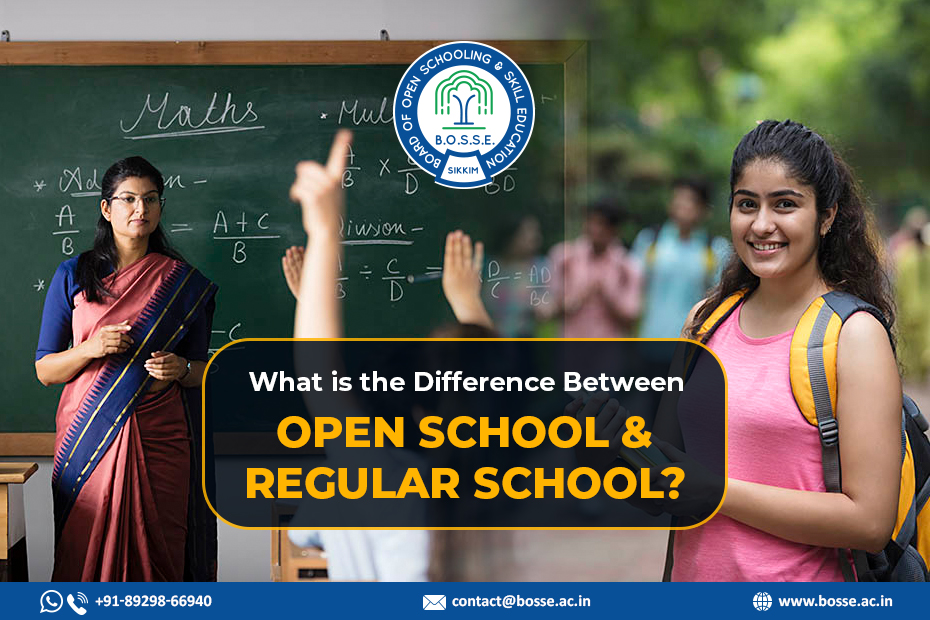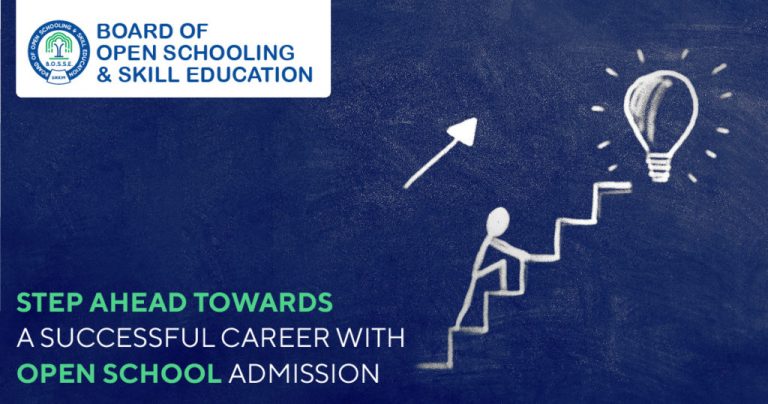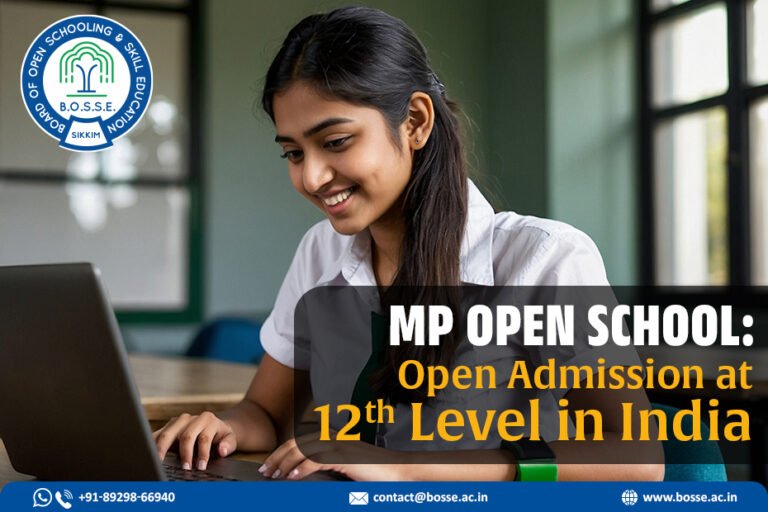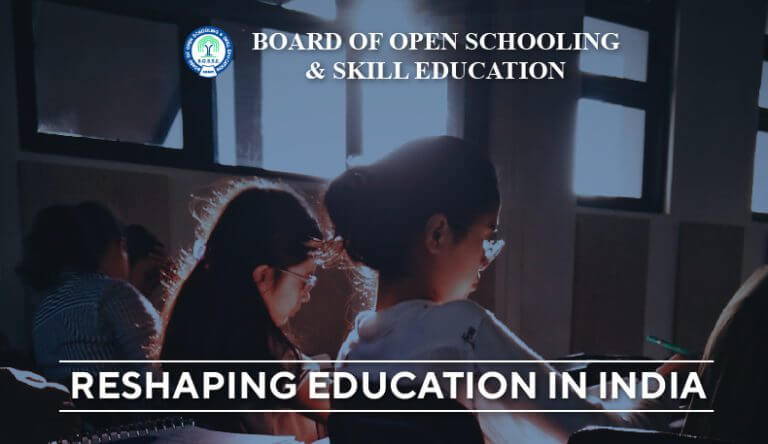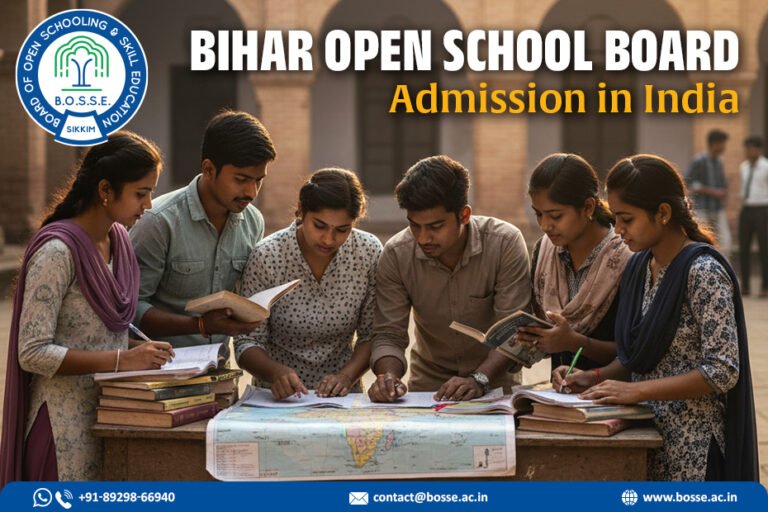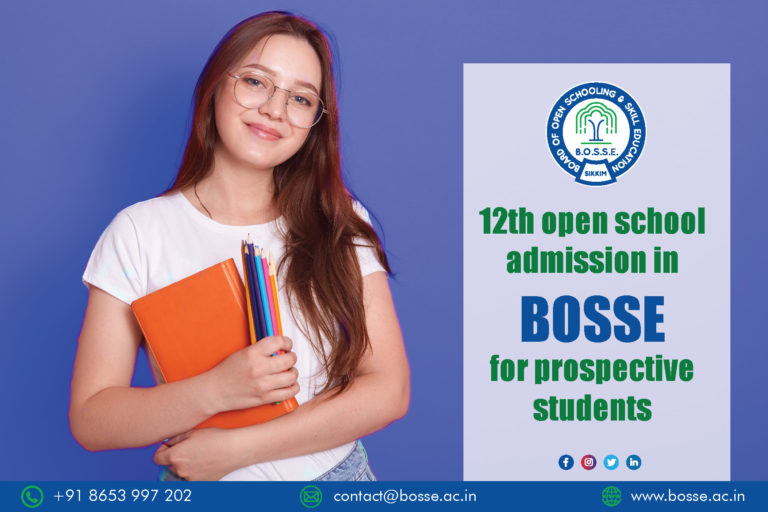What is the Difference Between Open School and Regular School
In the current dynamic nature of education, students and parents alike enjoy greater freedom than ever before in terms of learning routes in academic studies. Perhaps the most powerful and convenient alternative to the mainstream school system is open schooling. With the emergence of the open school board in India, including BOSSE (Board of Open Schooling and Skill Education), what sets open school apart from mainline school is growing in importance for learners everywhere.
This article discusses the main differences between these two systems and how open school schooling is revolutionizing access to learning.
Understanding Regular Schooling
A conventional school has a scheduled and standardized curriculum endorsed by a state or a central education board. It comprises daily class sessions, timetables, regular presence, exams, and grading. Children typically learn in classrooms for at least five to six hours a day and are frequently expected to engage in extracurricular activities, assemblies, and co-scholastic activities.
Conventional schools are ideally suited for children who perform best in a disciplined setting with regular peer contact, physical education, and a set academic timetable.
What is Open Schooling in India?
Open schooling is a more adaptable type of education that enables students to learn in their own time, at their own pace, and at their own convenience. Provided by organizations such as BOSSE—the top open school board of India—open schools are created to make space for students who cannot attend traditional schools due to personal, financial, or professional circumstances.
This program is best suited for:
- Working professionals looking for additional education
- Students from rural or remote locations
- People who have previously dropped out of school and wish to pursue it further
- Artists, athletes, or performers with busy schedules
- Homemakers or caregivers who need to pursue formal education
Structural and Curriculum Differences
One of the significant differences between open school and traditional school is their structure and how they deliver curriculum.
- Flexibility: Open schooling provides total flexibility regarding time, speed, and topic choice. Students get to decide how many subjects they want to study in a session, when to study, and how to show up for exams. This differs from conventional schools, in which students have to adhere to a pre-decided curriculum and schedule.
For instance, BOSSE’s 12th open school program lets students pick subjects in accordance with their career interests and sit for exams whenever they are ready, during the specified exam period.
- Mode of Learning: Learning in a conventional school is mainly face-to-face, wherein learning takes place in physical classrooms with teachers and peers. In open school, learning frequently takes place through online media, self-instructional material (SIMs), audio-video materials, and contact programs on an optional basis.
The BOSSE, similar to NIOS, also provides blended learning assistance, integrating conventional study material with digital learning tools for more meaningful learning experiences.
- Assessment and Exams: Regular schools have a pre-fixed examination schedule, usually with half-yearly and yearly examinations. Open school systems offer the scope to attempt exams in segments (On-Demand Examination System—ODES), and students can appear when they are prepared. This eliminates pressure at the examination level and encourages learner-friendliness.
Admission Process and Eligibility
Open school admission is usually much easier and more accessible than in regular schools. For instance, the 12th open school run by BOSSE does not need the student to have done formal 11th-grade schooling in a regular school. Minimal documentation and age and residence proof are mostly enough.
In contrast, admission to regular schools has cutoffs, entrance exams, and compulsory attendance requirements that might not be possible for all students.
Eligibility Criteria for Admission in 12th at BOSSE
The Board of Open Schooling and Skill Education (BOSSE), Sikkim, offers a free and open course for students to attain their senior secondary education through its 12th open school. On a mission to cater to the needs of different students, BOSSE offers every student belonging to a different background a chance to finish their education devoid of the strict structure of standard education.
Key Eligibility Criteria:
Minimum Educational Qualification: The candidate must have passed the Secondary (Class 10) exam of a recognized board (BOSSE, NIOS, CBSE, ICSE, state boards, etc.).
Minimum Age Requirement
- The candidate must be at least 15 years old as of 31st July of the admission year.
- Valid age proof (birth certificate, Aadhaar card, etc.) should be brought during the registration period.
Required Documents
- Attested copy of the Class 10 marksheet or certificate
- Proof of age (birth certificate, Aadhaar card, PAN card, etc.)
- Passport-size photographs
- Address proof (ration card, Aadhaar card, voter ID, etc.)
Open to All Learners
BOSSE’s 12th open school admission is open to:
- Regular students
- School dropouts
- Working professionals
- Homemakers
- Athletes or artists
- Anyone who cannot attend regular schooling
Subject Selection Flexibility: Students can choose a combination of subjects according to their interest and career goals from a wide range of academic and skill-based subjects.
Why BOSSE for Admission in 12th Open School?
- Recognized open school board in India
- Flexible cycles of admission
- Personalized learning pace
- Incorporation of instructional study material and electronic resources
- Genuine certification for further studies and employment
Note: Admissions are subject to documentary evidence and satisfactory compliance with eligibility criteria under BOSSE guidelines.
For more details, log on to www.bosse.ac.in or contact BOSSE’s admission support team.
Recognition and Equivalence
It is a common fallacy that open schooling is less efficient than conventional schooling. In fact, recognized open school boards in India, like BOSSE, NIOS, etc., are accredited by the government, and their certificates are considered equivalent to those provided by conventional boards.
BOSSE and other open board students are eligible to apply for higher education, government, competitive exams, and skill-based professions, just like CBSE, ICSE, or state board students.
Advantages and Disadvantages of Open Schooling
Advantages:
- Flexible learning timetable
- Affordable schooling
- Student-oriented assessment
- Second opportunity to pursue education
- Greater subject options
Disadvantages:
- Needs self-motivation and discipline
- Less face-to-face interaction
- Lacks extracurricular activities
But with changing technology and increasing consciousness, even these constraints are being met by new-age open school models.
Conclusion
Whether to opt for open schooling or conventional schooling is dependent finally on the requirements, aspirations, and situation of the learner. While conventional schools impart discipline and peer interaction, open school offers liberty, reach, and an individualized route to learning.
The open school board in India, like BOSSE, has empowered thousands of learners to complete their education, pursue their dreams, and gain recognized certifications without the constraints of traditional systems. Whether you’re a working professional, a dropout looking for a second chance, or someone needing a flexible education plan, open schooling is a transformative solution for lifelong learning.
Choose wisely—because education should fit your life, not the other way around.


